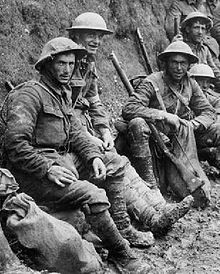This whole sonnet is very ironic, even making this a sonnet
is ironic. Sonnets are typically connected with love. This one has something to
do with bad love, but not anything to do with actual love. This is the toxic
love of nationalism, not love for someone else, nor was it in a positive light.
This poem is very accusing, the first line saying “You love us when we’re
heroes, home on leave, or wounded in a mentionable place.” This sets up the
idea of you, and us. You being people, not just women that glorify the idea of
men being heros of war, while us is the soldiers fighting. throughout the
sonnet, the idea of men in the army being a decoration for women, and how in
love with the idea women are that men are out there fighting. Yet Sassoon still
keeps that idea that war is disgraceful and is not something to glorify. “You
worship decorations; you believe that chivalry redeems the war’s disgrace.” The
sonnet seems to show the positive feelings that women felt from the war,
glorifying the horror that happens on the battlefield, but then seems to bring
them back to the reality of what war is actually like. The last line being the
most powerful line in this sonnet. “O German mother dreaming by the fire, while
you are knitting socks to send your son his face is trodden deeper in the mud.”
This shows the two sides of what is happening currently in the sonnet. On the
women's side, it is pleasant and glorifying those men fighting the ‘good’
fight. For the men though, it is brutal and awful. The son in the mud could easily
be interpreted as dead, and this can mean that the glory and effort women are
putting forth is not saving these men’s lives. They are all suffering and no
one’s there to help them. When I read that last line I was deeply disturbed, it
gives you a sense of sadness and maybe even hopelessness. Sassoon is trying to
make people feel how the men feel, and did pretty well to do that. Showing both
sides of the war, and showing that men and kids are dying. According to Michael
Scott “World War One was one
of the deadliest conflicts in the history of the human race, in which over 16
million people died. The total number of both civilian and military casualties
is estimated at around 37 million people.”
Glorifying people killing each other is a main core problem, it makes women
complicit with the war. It is also interesting to mention that in the sonnet
we assume that it is about British women, and then at the end it switches to
German mothers. This is suppose to show the contrast between glorizing war for
British women versus the German mother who does not seem to be glorifying the
men, she just assumably misses her son who is probably or will end up dead.
According to Griffiths, “the sudden turn to the presentation of a German mother
at home is surprising for the reader, after the focus on the insensitivity
and moral complicity of British women in the war. In some ways she is presented
more sympathetically than British women: her “dreaming”, because not elaborated
on, doesn’t seem as immediately corrupt as that of British women.” As stated
previously, it brings everyone back to reality that war is not a goal, it is
not something to glorify. At the end of the day, both ends end up having people
die who have families and lives. It was and never should be something to
romanticize.

Work Cited
Griffiths, G. M. “Glory of Women –
Siegfried Sassoon.” Move Him Into The Sun,
13 Nov. 2011,
movehimintothesun.wordpress.com/2011/04/09/glory-of-women-siegfried-sassoon/.
“How Many People Died in WW1?” History, 15 Nov. 2018,
www.historyonthenet.com/how-many-people-died-in-ww1.
We glorify war because some of our mentalities have not gone past fighting with spears and clubs. We want to overcome our enemy, showing a primal Darwinian survival of the fittest. War is what might be considered Darwinian theory that he theorized on animals that man swelled into the conflicts we raise due to our intelligence.
ReplyDeleteInteresting idea! I always assume its that, but there's always some kind of profit on one end. Thanks for commenting!
ReplyDeleteI agree that the sonnet seemed to make soldiers into decorations for women to parade around. Women became complicit in the war by fawning over letter, battle wounds, and wounded corpses like baubles worn around their necks or dangling from their earlobes. They knew nothing of the true war and yet relished in it anyway. They believed what they wanted to believe and romanticized the war. Well said, Dakota.
ReplyDeleteI enjoyed reading your insights over Sassoon's "Glory of Women." I am very curious to hear more female perspectives at this time, because I'm not so sold on the idea that all women were in full support of this war and turned a blind eye to the atrocities happening. I think a lot of this romanticizing came from the government. Propaganda was used initially to get men to enlist in order to fight the "good" fight. Otherwise, women would not be so inclined to let their husbands, brothers, and sons off to war. Additionally, this impacted men in that they were using rose-colored lenses to imagine themselves heroically fighting on the battle front, all in the name of protecting their country. In this sense, it goes both ways for men and women.
ReplyDelete